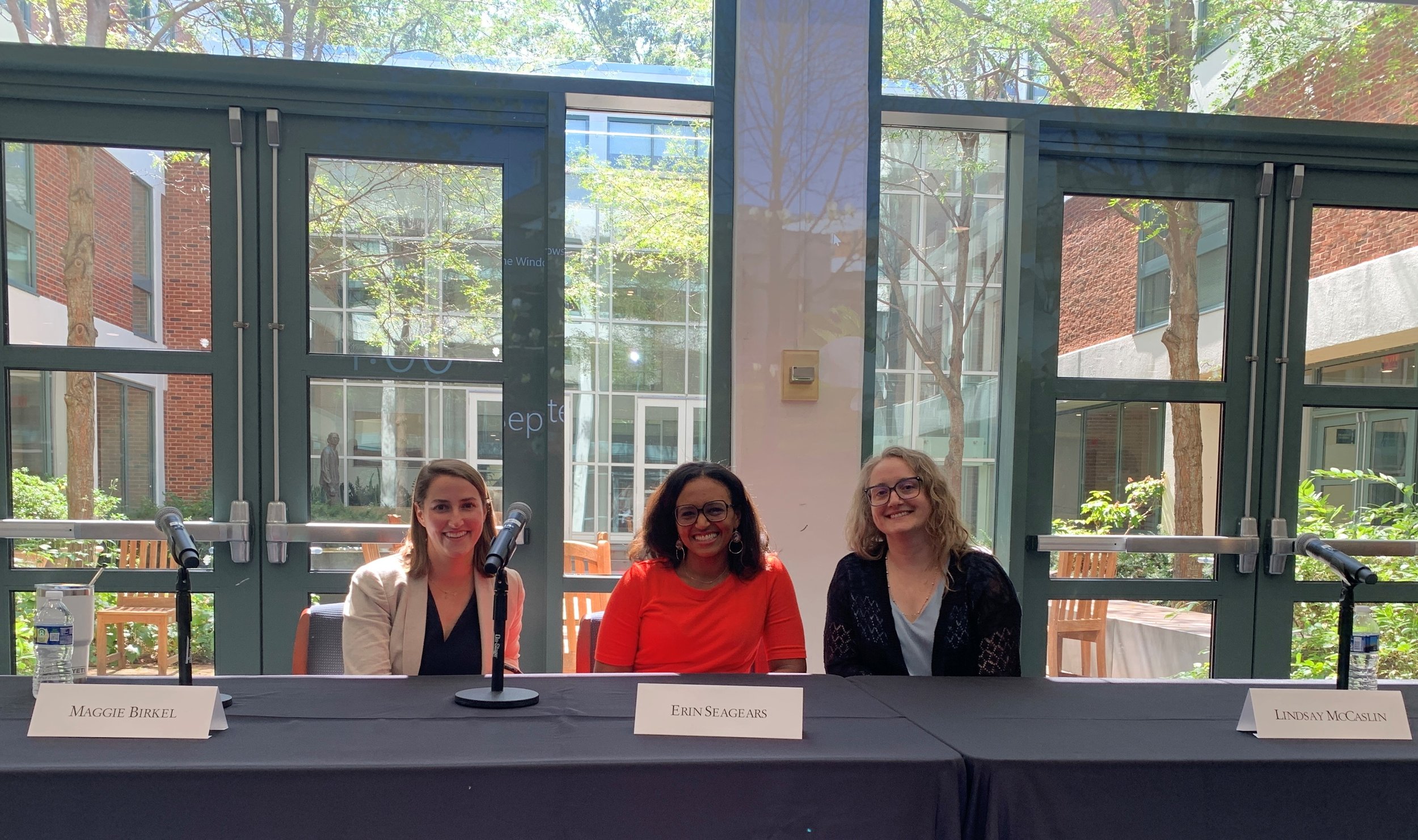UVA Alumnae Inspire Future Public Defenders
Brooke Boyer '26
Staff Editor
On September 14, Maggie Birkel ’18, Lindsay McCaslin ’09, and Erin Seagears ’20 returned to the Law School for the second installment of the “Real Deal” panel series on public defense. Students joined the alumnae in the Purcell Reading Room to gain a glimpse into their lives as successful public defenders, including the highlights of their careers, the challenges of public defense, and the wisdom they have to offer.
After graduating from UVA Law, Birkel, McCaslin, and Seagears pursued their long-held passions for working in public defense. Birkel is now the Deputy Director at the Second Look Project, an organization founded to provide legal support for individuals who received extreme sentences as young people in Washington, D.C. Before becoming involved in the Second Look Project, Birkel was a George Kaiser Family Foundation Women’s Justice Fellow at Still She Rises, the first public defender office that exclusively represents women.
Pictured (left to right): Maggie Birkel '18, Erin Seagers '20, and Lindsay McCaslin '09.
Photo Credit: Brooke Boyer '26
McCaslin, on the other hand, is an Assistant Federal Public Defender in Norfolk, Virginia. Her work entails representing her clients on a variety of charges and advocating for them in suppression hearings, jury trials, and at sentencing. Prior to this position, McCaslin was a state public defender in Virginia.
Last but not least, Seagears is an Assistant Public Defender in the Juvenile Division for the Maryland Office of the Public Defender. She was set on juvenile work from the first day of her law school career. Previously, she clerked for the Honorable John Nugent on the Baltimore City Circuit Court. While each of these women followed different career paths, their experiences and advice share several similarities.
Being a public defender requires more than the skills one learns in law school. As McCaslin and Seagears expressed, there is a lot of social work on the side because they regularly work with children and families. Emotional intelligence, or the ability to understand others’ emotions and manage one’s own, is also a critical skill for those working in public defense. The work undoubtedly bears an emotional toll, but each of the women contend that it is important to remain strong and rational while representing their clients.
The reality of being a public defender can be frustrating due to what McCaslin called the “backward” nature of the justice system. For example, Birkel stated that it is challenging to interact with people who “do not treat her clients like humans.” Many of her clients have been incarcerated for years, and it is disheartening for her to see that the law is not always applied in a way that is balanced and just. Seagears expanded on this point, expressing that the judge she gets on a particular case is a matter of pure luck. McCaslin agreed that it can take extensive effort to show a judge that a “kid is just a kid” at the end of the day. Because of this, leaving the fate of their cases in the hands of a judge can feel hopeless at times.
Despite the challenges and frustrations that come with working in public defense, Birkel, McCaslin, and Seagears unanimously agreed that it is an incredibly rewarding and fulfilling career path. It is an opportunity to make an impact in the lives of individuals and in the justice system itself. According to Birkel, working on cases for one to two years has resulted in the creation of deep relationships with her clients: “I know about the worst times of their lives and the best times of their lives.” She additionally spoke of the sense of community that has developed among her coworkers because they possess the same core values and work together toward a common goal. McCaslin has gratefully witnessed progress spurred by public defense work, including the passage of major legislation expanding children’s rights. Finally, Seagears answered without hesitation that advocating and fighting for her clients is the best part of her job.
For students interested in public defense, the alumnae gave advice on how to best prepare for and ultimately secure a job after graduation. Seagears and McCaslin encouraged students to take advantage of any opportunity to pursue public defense work during summers, winter breaks, and other extra free time because it is essential to show employers your dedication to that line of work. Only having experience in Big Law, therefore, will not be particularly convincing on a resume. McCaslin recommends taking advantage of the clinical experience UVA Law has to offer, such as the Criminal Defense Clinic and the Child Advocacy Clinic, in order to start building crucial skills early.
Birkel noted that “cold emailing” alumni and others in the UVA support system is a highly useful tool for developing connections and learning from those who already work in the field. Although it can be nerve-wracking to send an email to a stranger, those involved in public defense are thrilled to help other UVA Law students become involved in it as well.
---
ews6tm@virginia.edu

